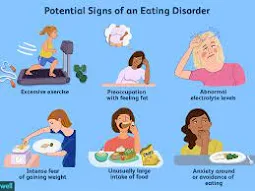Anorexia, bulimia, and voraciously consuming food aren't only for the youthful. What energizes outrageous food ways of behaving as the decades progressed?
photograph of a lady sitting on a lounge chair grasping her head with a spread of food on the foot stool before her
What does a dietary issue resemble? Liable to come into view is a youthful, waiflike lady swaggering down a catwalk, bones projecting under her dress. However her more seasoned sisters aren't resistant to anorexia, bulimia, and pigging out. Weight-control endeavors drift into a perilous area in additional ladies at midlife and past than famous pictures propose.
Its an obvious fact that the vast majority of us have consumed less calories eventually — a few of us consistently — yet ladies can confront exceptional stressors as we age that increment our dangers of dietary issues, Harvard specialists say. The afflictions of calorie limitation or gorge cleanse cycles on a more seasoned body, specifically, can likewise prompt deteriorated wellbeing impacts.
By age 40, one out of five ladies has managed a dietary issue, two times the extent recognized in ladies at age 21, as per a recent report in JAMA Organization Open. Many cases are probable a resurgence of a long-stewing design from prior years that might have gone unnoticed, says Dr. Holly Look, partner clinical head of the Klarman Dietary problems Community at Harvard-associated McLean Emergency clinic.
"Numerous ladies with dietary issues in midlife have had the issue for the majority of their lives," Dr. Look says. "Furthermore, a ton are carrying on with significant life changes beginning around age 40 that are not the same as those of a high school or young lady."
Disarranged eating that scarcely skirts the line among typical and hazardous is additionally profoundly normal, more so than analyzed dietary problems. "Up to midlife, it could seem to be persistent slimming down, yo eating fewer carbs, or over the top activity. In some cases ladies get enveloped with this personality of being a fitness junkie who eats exceptionally perfect, and menopause-powered body changes make them slope it up much more," Dr. Look says. "It may not actually feel like an issue to them. It gets truly muddled."
Midlife risk factors
Numerous varieties of dietary issues are conceivable, however three sorts overwhelm: anorexia nervosa, described by outrageous food limitation; bulimia nervosa, pigging out followed by cleansing through regurgitating or diuretic use; and gorging problem, eating immense sums beyond the purpose in feeling full.
Anorexia turns out to be more uncommon after age 26, however bulimia rates don't finish out until age 47, as per a November 2017 concentrate in the Global Diary of Dietary problems. In the mean time, gorging jumble — the most well-known dietary issue in all grown-ups — can keep on being an issue for ladies in their 70s.
What powers such pathologic distraction with food and weight as the decades progressed? Midlife and more established ladies might be attempting to remain cutthroat in the working environment, where slimness might be related with youth, or reappear on the dating scene after separation or widowhood. The shock of a vacant home may likewise drive body-reclassifying endeavors.
"The significance of self-perception is by all accounts a key component that makes ladies either return to or begin a dietary problem," says Dr. Bettina Bentley, an essential consideration doctor at Harvard College Wellbeing Administrations. "With maturing, numerous ladies are additionally upset by the absence of command over the manners in which their body is evolving."
Without a doubt, estrogen shifts connected with the menopause progress can increase dietary problem chances. "We realize that estrogen assumes a part in fostering a dietary problem on the two closures of the age range, yet as far as why, the jury is still out," Dr. Look says. "Ladies during menopause are bound to put on weight, and you might feel your body is neutralizing you."
How might you detect a dietary issue?
Outrageous weight reduction is an obvious indicator somebody might have a dietary problem. Yet, by what other method could you detect this condition in yourself or others? Search for
emotional weight changes, whether up or down
distraction with weight, calories, and body size and shape
refusal to eat specific food sources or classifications of food varieties (like sugar or carbs)
exorbitant working out
skipping feasts or eating just small divides at normal dinners
food customs, for example, unreasonable biting or not permitting various food varieties on a plate to contact
indications of cleansing ways of behaving, for example, continuous washroom trips, regurgitating sounds or scents, or purgative coverings
heaps of void food coverings or compartments inside brief periods.
"Whenever these contemplations and ways of behaving are assuming control over your life, it's an indication to look for help," says Dr. Holly Look, partner clinical overseer of the Klarman Dietary problems Community at McLean Clinic.
Exhibit of wellbeing impacts
In any event, when undetectable to other people, dietary problems can negatively affect the body. At the very least, ladies with dietary issues are in many cases lacking in certain supplements, especially iron, vitamin B12, calcium, and vitamin D, says Margaret Schrier, an enlisted dietitian and head of nourishment at Harvard College Wellbeing Administrations. "Enhancements can assist with inadequacies and are generally all around endured by patients," Schrier says. She prompts taking them with food, since they may not be retained too while starving.
Outrageous weight reduction, cleansing, and hunger can likewise prompt these issues:
Bone misfortune. The gamble of bone break is multiple times higher in somebody who's had anorexia than in everybody, Dr. Bentley says. While bone thickness testing isn't regularly suggested for ladies in their 50s, she arranges it for those she thinks could have a dietary issue as well as those who've broken bones.
Heart issues. Lower electrolyte levels from confused eating can prompt a sporadic heartbeat. Ladies in midlife are likewise bound to take meds for constant circumstances, which can expand this gamble. "It's all the more a recipe for a health related crisis, on the grounds that your body simply isn't generally so tough as when you were 16," Dr. Look says.
Lung conditions. Chest muscles become more fragile after some time, particularly in individuals who over and again compel themselves to upchuck. This raises pneumonia risk.
Gastrointestinal issues. Reflux, swelling, queasiness, heaving, obstruction, or the runs might be excused as results of maturing however rather might be connected with a dietary issue.
Diabetes. Individuals with voraciously consuming food issue have far higher paces of diabetes, possible powered by successive glucose spikes in the wake of glutting, Dr. Bentley says.
Skin breakdown. Unfortunate injury mending and significant facial wrinkling is normal in individuals with longstanding anorexia, Dr. Bentley says. This presumably reflects by and large poor nourishing status.
While dietary problems guarantee a bigger number of lives than some other kind of mental sickness, just 27% of those impacted look for proficient assistance. A group of wellbeing experts that incorporate a dietitian and specialist can assist with shepherding patients to better physical and mental health. On the off chance that you suspect you have a dietary problem, feel free to have a candid discussion with your PCP. She is prepared to survey and regard dietary problems as she would some other ailment, without judgment.
Need A Help Chat with A Doctor now 247 online
Enjoyed this post? Never miss out on future posts



